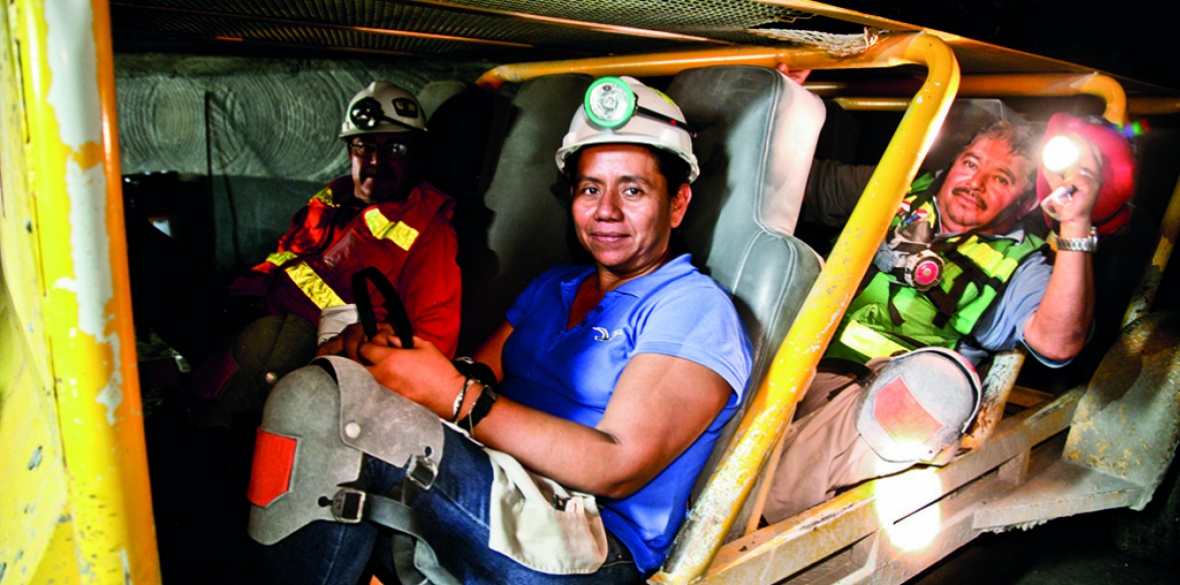This is the last article you can read this month
You can read more article this month
You can read more articles this month
Sorry your limit is up for this month
Reset on:
Please help support the Morning Star by subscribing here
IN ADDITION to health, welfare and education, Mexican President Andres Manuel Lopez Obrador ’s 4T Transformation is bringing real improvements for organised labour and for workers in general.
While visiting the country recently I was able to talk to Miners Union leader and Morena party Senator Napoleon Gomez Urrutia, who has been at the forefront of the struggle for workers’ rights and union democracy.
For decades most unions in Mexico were notoriously corrupt and manipulated by the governing party.
The Miners Union was one of the few independent organisations, and Gomez Urrutia was forced to leave for Canada where he led the union from exile for nine years until Amlo, on becoming president in 2018, invited him back.
Gomez Urrutia, who visited Britain and met Jeremy Corbyn and TUC leaders in 2017, has led successful campaigns for reforms since becoming a senator.
He regards the law to ban fraudulent outsourcing or subcontracting, which took effect in September 2021 after a two-year legislative battle, as the most important reform of all.
As in many countries including Britain, neoliberals had dismantled legal protections, allowing companies to outsource activities and thereby deprive unionised workers of contractual conditions and benefits.
In Mexico it had become standard practice to lay off workers in November to avoid paying their Christmas bonus and also deprive them of social security benefits, and then rehire them in January.
The proposal to outlaw this abusive practice inevitably met fierce corporate hostility, backed by opposition parties and even some in Morena (bureaucrats in some government departments used the practice against civil servants).
After much discussion the law was passed: employers are not allowed to outsource their main economic activity, only specific ancillary functions (like catering for a manufacturing company), and unless these functions are clearly temporary, these workers must also have appropriate contractual rights.
Implementation of the law is a constant battle, but Gomez Urrutia points out that since it came into force the number of workers registered with the Social Security Institute (in other words, with permanent formal benefits) has increased by 3.5 million.
Union democracy is also now guaranteed in law, with elections supervised by the Labour Ministry, thus ending bribery and corruption which were previously the norm in most unions whose leaders were nicknamed charros (cowboys).
Free collective bargaining and union rights were included for the first time in the new Mexico-US-Canada Trade Agreement, signed in July 2020.
The Morena government’s pro-labour policy is also producing results in important legacy conflicts, of groups of workers unjustly treated in previous disputes.
Thus when the public electricity utility Luz y Fuerza del Centro, supplying most of central Mexico, was shut down and its services privatised in 2009, thousands of workers were denied compensation.
Amlo’s government has now negotiated a deal to provide for surviving workers and their families.
Another such legacy conflict involves Gomez Urrutia’s Miners Union and workers at Cananea, a mining town near the US border. Linked with a famous 1906 dispute which helped pave the way for Mexico’s historic revolution, Cananea still has problems and the current dispute dates from 2006.
Section 65 of the Miners Union went on strike in 2006 against Grupo Mexico, a company whose boss, German Larrea, owns numerous mining and related businesses and is notorious for his union-busting practices.
Larrea is also in dispute with the Miners Union in two current conflicts (at Taxco and Sombrerete). But possibly the most serious dispute concerns responsibility for the abandonment of 65 coalminers in the Pasta de Conchos disaster in 2006.
Following a gas explosion, efforts to rescue the miners were prematurely abandoned on Larrea’s orders when only two of the 65 had been retrieved; everything suggests that the rest might well have been saved, but they were left for dead and to this day their bodies have not been recovered.
The Miners Union under Gomez Urrutia continues to pursue this as a case of corporate manslaughter, and Amlo has agreed to a new publicly funded effort to recover the bodies 15 years later.
These legacy disputes have enormous significance for the trade union movement, but most important is a future based on recognition of rights for all workers.
The legal requirement of democratic elections recently led to an independent union gaining recognition at a big General Motors plant in Guanajuato state, and the right of domestic workers to organise and to receive social security benefits has just been confirmed by a cross-party Mexican Senate committee chaired by Gomez Urrutia.
The labour movement is both a beneficiary and an active participant in Mexico’s transformation under Amlo and is now actively involved in the campaign against corruption which the president regards as the country’s greatest evil.
David Raby is a retired academic and independent researcher on Latin America. He can be reached at [email protected] and on Twitter @DLRaby.











